Course

When most people hear the words “machine learning,” the first thought that comes to their mind is data science.
Dubbed the “Sexiest Job of the 20th Century” by Harvard Business Review in 2011, the field of data science has witnessed massive growth in the past decade. Students, graduates, and working professionals from different backgrounds have rushed to break into the industry and land a data science job. Many of them have done so successfully just by taking online courses and teaching themselves the subject material.
The amount of data organizations collect has grown exponentially in the past few years, leading to the rise of many new machine learning roles.
In this article, we will discuss a few career options that involve machine learning and are worth pursuing in 2026.
The 7 Best Machine Learning Jobs
Below, we've highlighted some of the top jobs in machine learning in 2026. We've also picked out some of the essential skills you'll need to work in these roles and courses that can help you get the relevant jobs. If you're looking for the best machine learning opportunities in the data industry, check out DataCamp's Jobs to find roles tailored to your skills.
1. Data Scientist
First, let’s explore the role of a data scientist to understand what the job truly entails.
Data scientists are individuals who add business value to an organization with the help of data.
As a data scientist, you should be able to collect, pre-process, and analyze large amounts of data to develop insights that solve a business problem. You will also be required to employ machine learning modeling techniques to develop predictions that drive business growth.
Skills required to become a data scientist:
Data scientists are expected to have a strong grasp of at least one programming language - generally R or Python. You should also be able to extract and manipulate data with SQL, build machine learning algorithms, and analyze datasets using statistical techniques. Python packages such as Numpy, Pandas, Matplotlib, and Keras are commonly used by data science teams in companies for data analysis and model building. Learning to work with these packages is a good idea, as some data science interviewers will test your knowledge of them.
If you would like to develop your skills in data science and land a job in the field, Datacamp has two great career tracks to help you get started: Data Science with Python and Data Science with R.
As a data scientist, you will also be required to translate business requirements into functional machine learning models. In order to do this, you need to have a grasp of the field in which you work. If you would like to work in marketing, for example, it is a good idea to learn some frequently used marketing metrics and terms, as this will help you better understand the business problem at hand before coming up with an analysis.
Take this marketing analytics course by Datacamp to gain domain-specific knowledge and stand out from other data science aspirants.
To get a better understanding of what companies expect from data scientists, take a look at this job listing by HP:
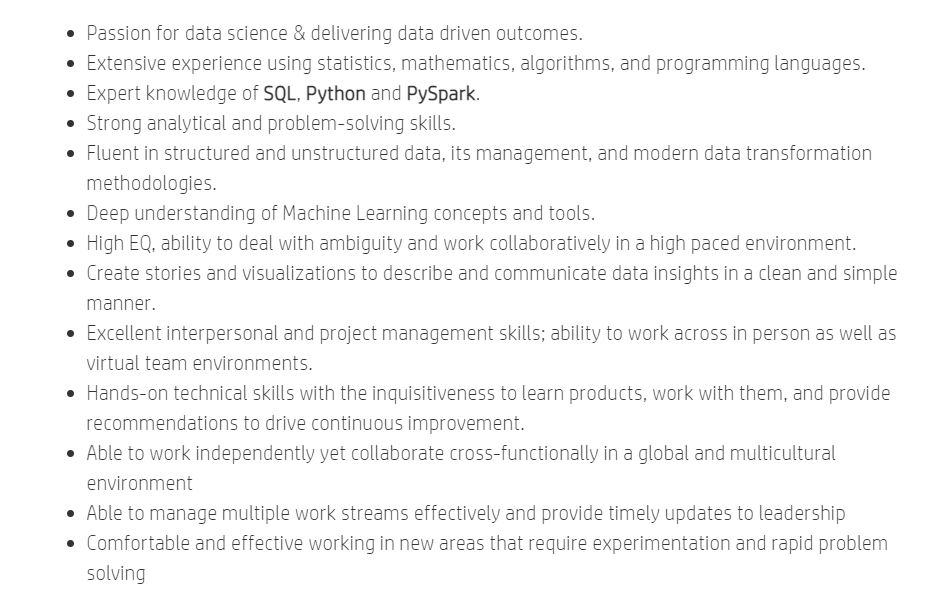
According to Glassdoor, in 2026, the average data scientist’s salary in the US is $143K - $197K per year. At large tech companies like Google, Meta, and Apple, this number increases to an average of $170,000, going up to almost $300,000 for the highest-paid individuals.
2. MLOps Engineer
MLOps engineers productionize and scale predictive models built by data scientists. Their job is to convert data science code into a functional end product with which users can interact.
Here is an example of the kind of task you will work on as an MLOps engineer:
You join an airline company, and the data scientists there build a machine learning algorithm to predict users who are most likely to purchase flight insurance. The entire model is created in a Jupyter Notebook, and you are required to embed it into the company’s website.
The system you build should be able to redirect customers to different touchpoints on the website based on their actions. For instance, if the machine learning algorithm predicts that the client will likely purchase insurance, the customer will be redirected to a web page featuring different flight insurance plans.
After deploying the machine learning algorithm, you need to implement a process for continuously monitoring model performance. Real-world data is always shifting, so the predictive model can degrade. Metrics and logs must be checked occasionally to understand where things are going wrong, and if the model doesn’t perform well in production, it might have to be retrained.
You also need to perform data and model versioning when required. Any amendments to the training dataset or predictive algorithm must be tracked, and previous versions should be kept to ensure that they can be restored at any time.
Finally, as an MLOps engineer, you must verify that the system you build is secure and that no sensitive user data is compromised. To achieve this, you can implement access control mechanisms, verify that the infrastructure created meets compliance policies, and introduce effective model reporting capabilities.
Skills required to become an MLOps engineer:
As an MLOps engineer, you will generally not be required to build a predictive algorithm from scratch. However, you will still be expected to work with machine learning libraries like Tensorflow, Keras, and PyTorch, so make sure to add these to your toolbelt.
You also need to understand the fundamentals of ML algorithms since much of your work involves refactoring data scientists’ codes and making them production-ready.
Finally, because your main task is automating machine learning workflows, you must understand software development and MLOps concepts such as CI/CD pipelines.
For a better understanding of exactly what companies expect of an MLOps engineer, take a look at this MLOps engineer job listing by Manifold:
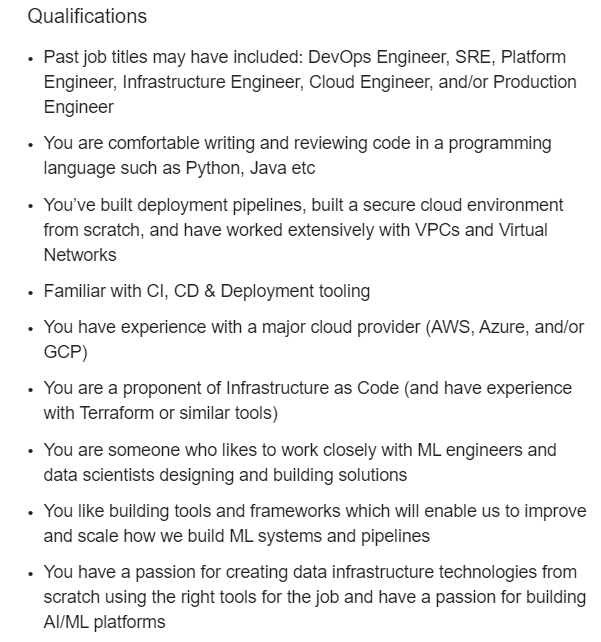
The average MLOps engineer salary in the US is $164,000 annually.
3. Machine Learning Engineer
While a data scientist’s job is centered around building predictive models, a machine learning engineer designs scalable AI products that end users can interact with.
A few differences exist between a machine learning engineer and a data scientist.
Data scientists write code primarily in R or Python, analyze data, and build predictive models to solve a company’s business problem. Much of their work is highly statistical and revolves around generating business insight.
On the other hand, machine learning engineers are responsible for building and training machine learning pipelines. In some cases, they also perform MLOps tasks such as taking these models into production and continuously monitoring and retraining predictive algorithms when necessary.
Here is an example of the kind of task you will work on as a machine learning engineer:
You get hired at a music streaming company and join the product team. You are required to build a recommendation system pipeline and ship this model into production. The application you deploy should ingest user data and provide each customer with personalized recommendations based on their existing music preferences. You must also constantly monitor model performance and retrain the recommender system when necessary.
Skills required to become a machine learning engineer:
Machine learning engineers sit at the intersection of data science and software engineering and are expected to possess an understanding of both domains. If you’d like to become a machine learning engineer, make sure to learn statistics, probability, and the fundamentals of machine learning modeling.
You also need to understand software engineering principles like abstraction, modularity, and version control, as you will be creating scalable applications with which end-users interact.
Finally, as a machine learning engineer, you need to possess knowledge of MLOps and be well-versed in the best practices involved when deploying data science models into production.
Here is a screenshot of Spotify’s machine learning engineer job listing:
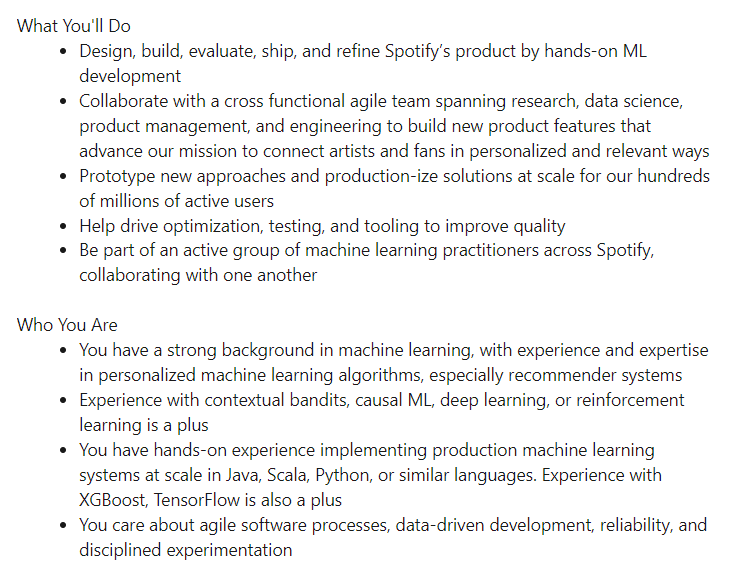
According to Indeed, the average machine learning engineer salary in the US is $162,000 annually. However, large corporations like Meta, Netflix, and Apple offer a base salary of over $180,000 for an ML engineer role, which is on par with their data scientist salaries.
If you’d like to learn the skills necessary to become a machine learning engineer, Datacamp’s Machine Learning Fundamentals with Python course is a great place to start.
You can also read this article to gain further insight into the role of a machine learning engineer and how you can become one.
Disclaimer: There is a lot of overlap between the roles of a data scientist, machine learning engineer, and MLOps engineer. While this article provides an explanation of all three roles based on their traditional definitions, companies can hire for these job titles interchangeably.
4. Data Science Consultant
As a data science consultant, you will work with a consulting firm to develop machine learning and AI solutions for their clients.
In a typical data science role, you work for a single company in a fixed domain and solve business problems within the organization. However, as a consultant, you will work on many projects with clients in different industries.
There are two types of data science consultants. The first is a machine learning strategy consultant who develops an AI-driven strategy to solve a client’s problem but does not actually implement it. Top-tier consulting firms like McKinsey and BCG fall into this category, and their consultants conceptualize solutions rather than actually building out end-to-end systems.
The second type of data science consultant is the builder. Companies like Deloitte and Accenture fall into this category, and their data scientists actually implement fully functional AI products for their clients.
Skills required to become a data science consultant:
There is a lot of overlap between the role of a standard data scientist and that of a data science consultant. They are both expected to know how to build machine learning algorithms, analyze large amounts of data, and add business value with their expertise.
However, data science consultants are also often expected to have phenomenal communication and presentation skills as they interact with clients. A consultant's biggest strength is their ability to translate data into actionable insights that non-technical people can easily digest.
If you are interested in becoming a data science consultant and would like to hone your skills in data storytelling, you can take Datacamp's Data Communication Concepts course.
Also, since consultants work on many different projects for a variety of clients, they are required to be able to use a wide set of tools. For example, while most companies list either R or Python as a prerequisite for a machine learning job, McKinsey usually requires candidates to be proficient in both languages to become a consultant.
Here is a screenshot of McKinsey’s job description for a data science consultant:
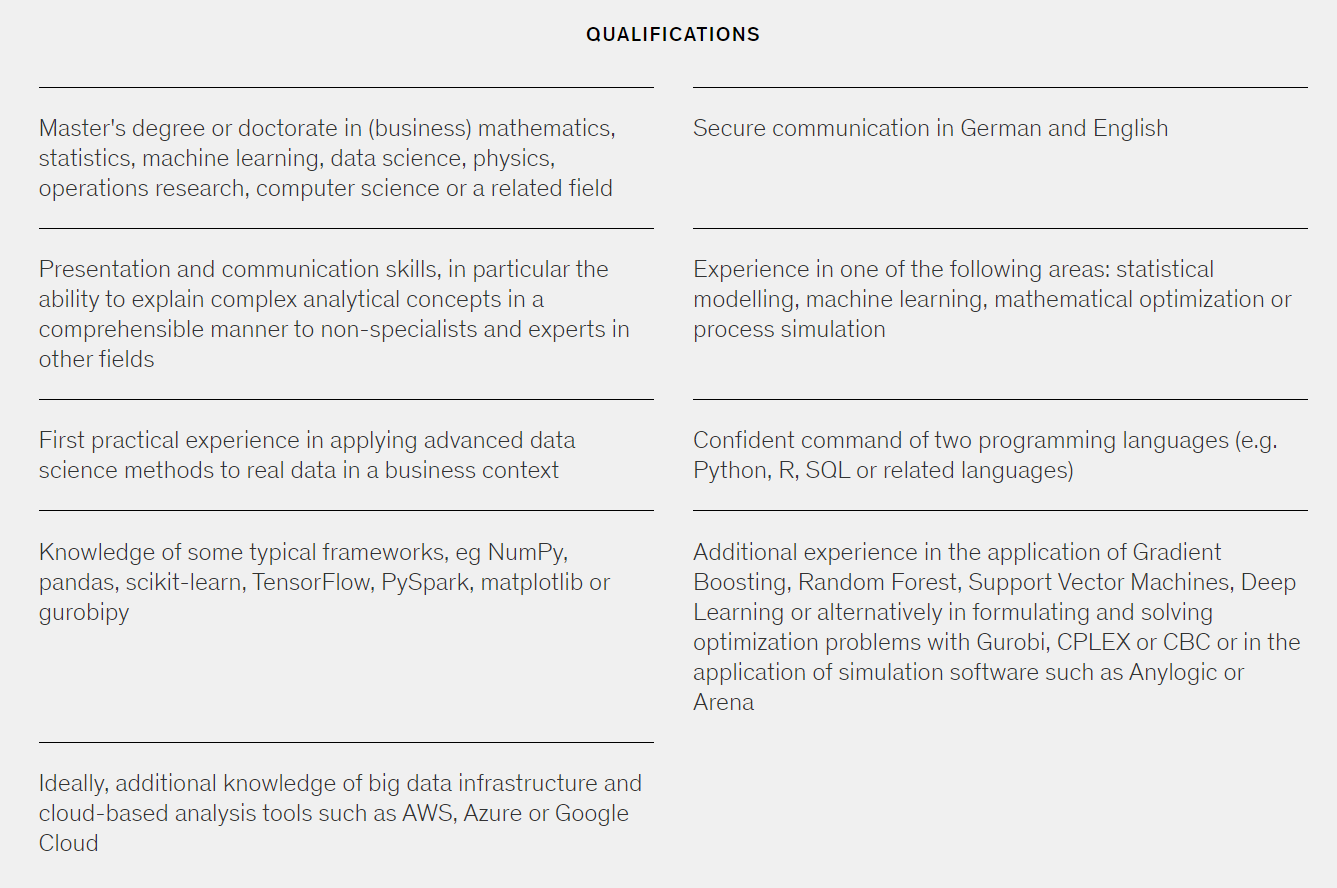
According to Glassdoor, the average salary of a data science consultant is $118,000 per year. However, top consulting firms such as McKinsey and BCG pay their data science consultants an average of $160,000 to $200,000 annually.
5. Machine Learning Research Scientist
While a data scientist builds machine learning models to drive business value, a research scientist creates custom AI solutions from scratch. A machine learning researcher works in an academic or large firm like Google that funds research.
Machine learning research is theory-heavy, and researchers usually focus on developing new machine learning models or improving the performance of existing algorithms.
There is a stark contrast between machine learning practitioners and research scientists.
In ML research, even a marginal increase of 0.2% in model accuracy can be considered a breakthrough and is worth writing a paper about. In contrast, someone working to implement a machine learning solution for an organization would not really be concerned with a small increase in performance, especially if it is at the expense of company time and computational power.
Also, while machine learning industry practitioners are often generalists who are able to manage end-to-end project workflows, researchers are highly specialized in a single aspect of the field and continue to make discoveries in that specific area.
Skills required to become a machine learning research scientist:
As machine learning researchers are highly specialized academics, they are often required to have a master’s or PhD degree, should be skilled in writing research papers, and must know at least one programming language. Machine learning skills in a specific field, such as optimization or regression analysis, are also necessary.
Here is a screenshot of Google’s job description for a machine learning research scientist:
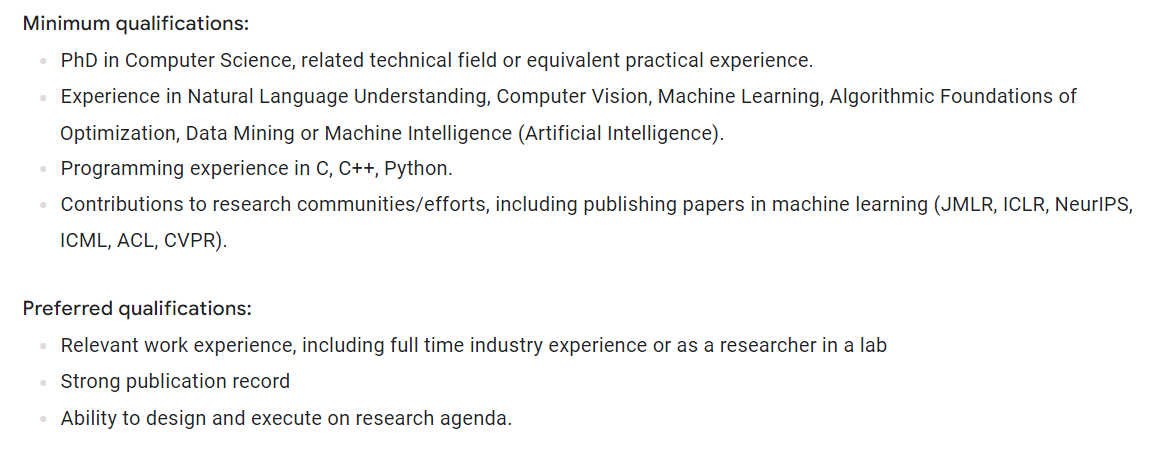
According to Glassdoor, the average annual salary of a machine learning research scientist is $151,124.
If you want to become a machine learning research scientist but are unsure where to start, check out Datacamp's Machine Learning Scientist with Python learning track.
6. Computer Vision Engineer
As a computer vision engineer, you will develop object detection, face recognition, and pose estimation models for various organizational use cases.
If you were to work at a company that develops security solutions, for example, you might be tasked with developing an intrusion detection system to identify and prevent threats from taking place in a timely manner.
The role of a computer vision engineer is highly specialized as their area of focus is limited to a single domain. Companies that hire computer vision engineers usually either expect them to come up with a novel solution in the field or improve upon available existing solutions.
This differs from a generalist role like ML engineering, where pre-trained models or existing packages can be applied to solve a business problem.
Skills required to become a computer vision engineer:
To become a computer vision engineer, you need to have strong programming skills and some knowledge of software engineering principles. Learn to solve DSA (Data Structures and Algorithms) questions, as these are frequently asked in interviews.
Since you will be building out computer vision applications, you need to know how to translate the company’s requirements into an end product. You are, therefore, expected to have some knowledge of system design.
Finally, learn calculus, statistics, mathematical optimization, and linear algebra, as these are the building blocks of machine learning algorithms. If you are a machine learning beginner and lack the required foundational math knowledge, you can start by taking Datacamp’s Introduction to Linear Algebra course.
If you would like a better understanding of the skills required to become a computer vision engineer, take a look at this job listing by Tesla:
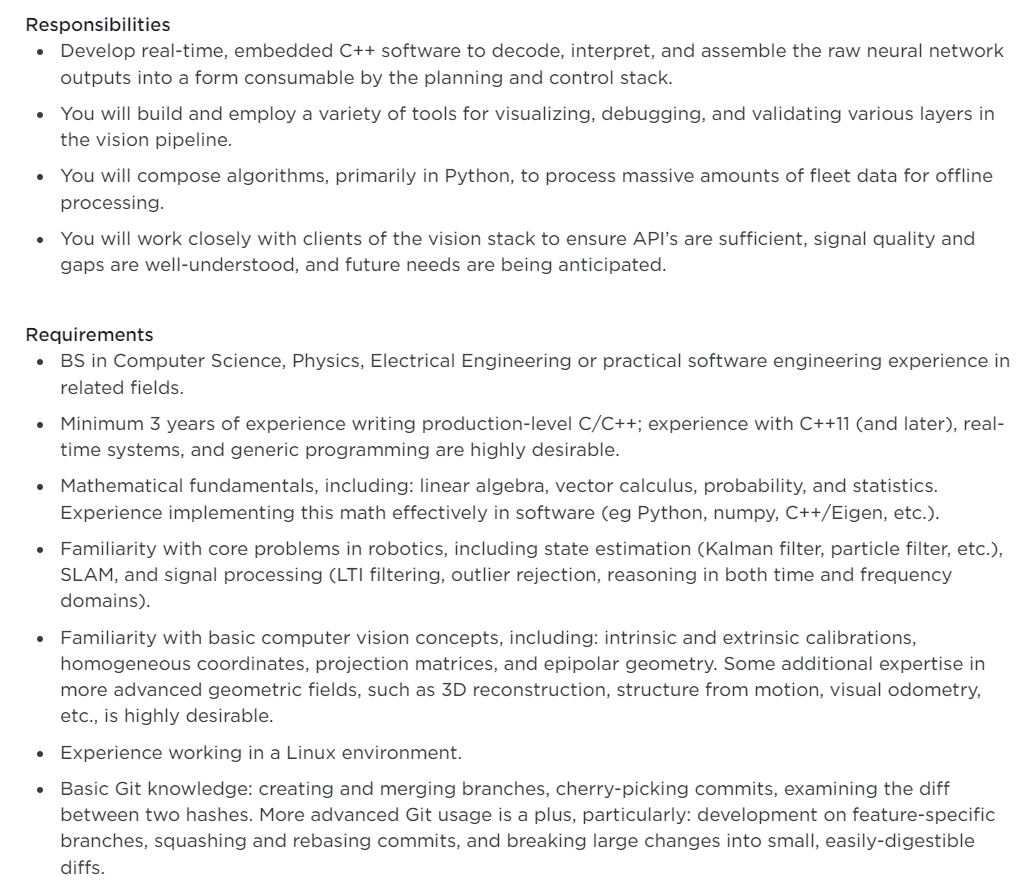
According to Indeed, the average salary for a computer vision engineer is $124,000 per year. In companies like Meta and Apple, this number can rise to $150,000-$200,000 annually.
7. Machine Learning Instructor
After gaining proficiency in the field, you can start creating content on the topic to educate machine learning aspirants. The field of machine learning is broad, and many students from different backgrounds are attempting to teach themselves the subject material online.
Online learning sites like DataCamp are often on the lookout for trainers who are able to cater to these students’ needs, and you can always apply to become an instructor on the platform.
YouTube and Udemy are also great places to start out if you have specific topics in mind that you would like to share with the machine learning community.
These are all great ways to build a stream of passive income with your expertise while maintaining a full-time job.
Skills required to become a machine learning instructor:
As a machine learning instructor, you must have exceptional communication skills and be able to break down highly technical concepts to a non-technical audience. You are generally expected to have some experience working in the field of machine learning, but this is not always a hard requirement as long as you can demonstrate sufficient depth of knowledge in the subject you are teaching.
Here is a screenshot of a machine learning instructor job listing by an online learning platform called FourthBrain:
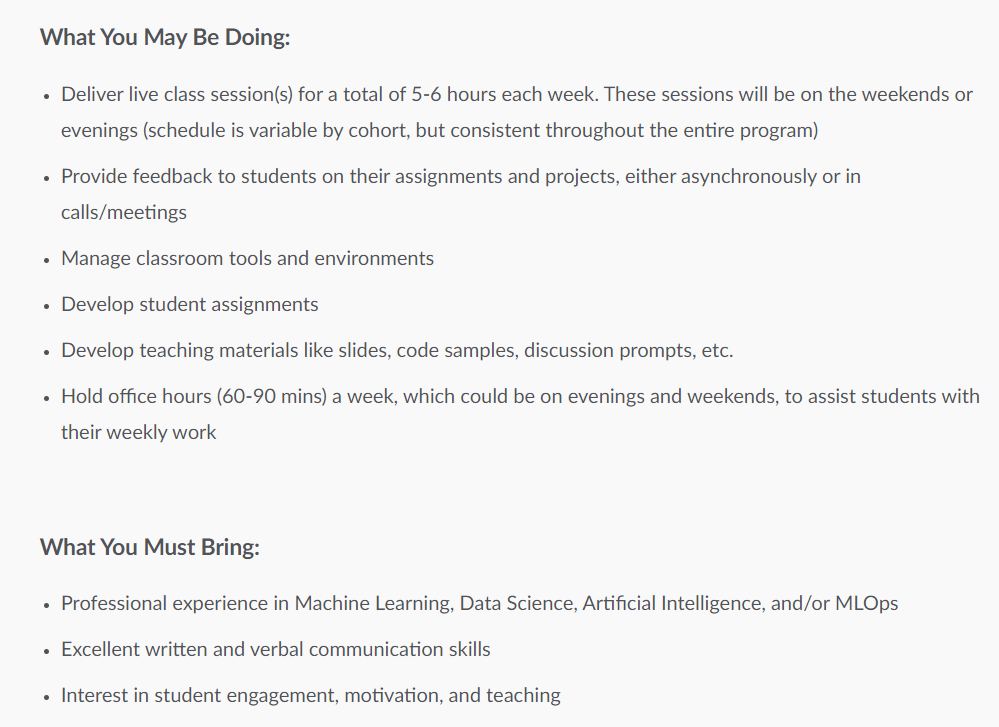
According to Glassdoor, the average annual salary for a machine learning trainer in the US is $124,812. However, since most companies hire instructors freelance or pay them based on course revenue, this amount can vary. For example, top machine learning instructors on Udemy, like Jose Portilla, earn approximately $1 million to $4 million solely from their online courses.
Deciding on a Machine Learning Career Path
As you can gather from the career options listed above, machine learning is a field with vast opportunities for people who come from different backgrounds. Jobs in the industry compensate very well, with an annual salary of $100,000 on the pay scale's lower end.
Data science is one of your career options if you are looking for a machine learning role, but it is not the only one. Choosing a role that aligns with your goals and values is important, so take your time in selecting a job that you find most interesting.
For example, if you enjoy communicating with people daily and are highly persuasive by nature, you would likely fare well as a data science consultant or instructor. However, if you are a more technical person who enjoys programming and creating end-to-end products, then you should consider pursuing a career in machine learning or MLOps engineering.
Specialized roles such as machine learning research can make fulfilling careers if you are inclined towards a specific area like speech recognition or computer vision. Have you ever felt like it might be exciting to help build out Tesla’s object detection system to improve the car’s self-driving capabilities? If so, a computer vision engineering job might suit you.
At the end of the day, all machine learning roles pay well and have room for continuous growth and improvement. No job is strictly better than the other, and making a final career decision solely depends on your interests and capabilities.
FAQs
What are the differences between the skills required for a data scientist and a machine learning engineer?
While both data scientists and machine learning engineers require proficiency in programming languages like Python, data scientists primarily focus on data analysis, building predictive models, and generating business insights. They often use tools like R, SQL, and statistical techniques. In contrast, machine learning engineers focus more on the development and deployment of scalable machine learning pipelines, requiring strong software engineering skills, including knowledge of CI/CD pipelines, version control, and software design principles.
How does the job market for machine learning roles differ between industries?
The demand for machine learning professionals varies significantly across industries. For example, tech giants like Google and Meta offer higher salaries and more advanced technical roles, while industries such as finance, healthcare, and manufacturing may focus more on applied machine learning for specific business problems. Consulting firms may require a broader range of skills to cater to various clients, whereas academic and research institutions focus on developing new algorithms and models.
How important is domain-specific knowledge in different machine learning roles?
Domain-specific knowledge is crucial in roles like data scientists and machine learning engineers, especially when translating business problems into functional machine learning models. Understanding the specific metrics, terminology, and challenges of the industry you’re working in (e.g., healthcare, finance, or marketing) can significantly improve the effectiveness of the models and solutions developed.
What role does continuous learning play in a machine learning career, and how can professionals stay up to date?
Continuous learning is vital in machine learning due to the rapid advancements in algorithms, tools, and techniques. Professionals can stay up to date by taking advanced courses, attending workshops, participating in online communities, and following research papers in the field. Platforms like DataCamp offer resources for ongoing education, and staying engaged with the latest industry trends is essential for long-term career success.

Natassha is a data consultant who works at the intersection of data science and marketing. She believes that data, when used wisely, can inspire tremendous growth for individuals and organizations. As a self-taught data professional, Natassha loves writing articles that help other data science aspirants break into the industry. Her articles on her personal blog, as well as external publications garner an average of 200K monthly views.





